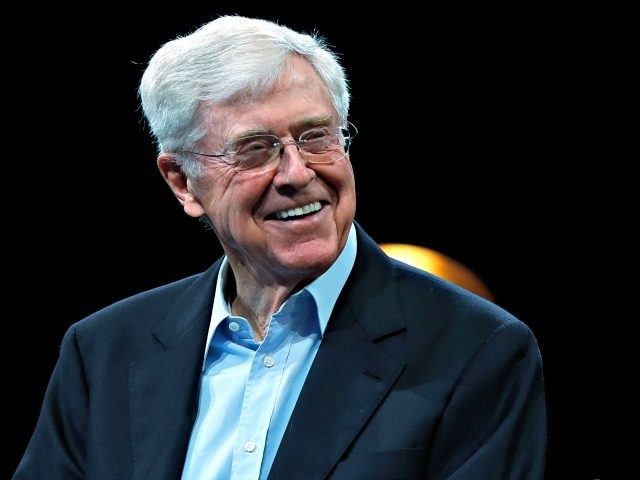Billionaire Charles Koch told an interviewer that he was “horrified” when political donations failed to buy politicians’ votes on immigration and other issues.
“Some of the politicians that we had helped get elected, I would see them on TV, and they would be talking about policies that were antithetical [to our goals] — against immigration, against criminal justice reform, against a more peaceful foreign policy. I was horrified,” he told Axios for a November 24 interview.
Koch, whose personal wealth is roughly $50 billion, continued:
We had vetted them all and they all seem aligned with our major issues, and on empowering people. And then once they got elected, but — I didn’t expect them to fully agree with us on everything, but to be at least be champions on some of the major ones we were working on and that they said they were — and then do the opposite.
In the Axios interview, Koch buries his cheap labor, pro-migration goals under various euphemisms, including a “society of equal rights and mutual benefits, where people could realize their potential.” For example, he said:
We couldn’t get results and the whole purpose of getting into politics was to find people who would help move us toward a society of equal rights and mutual benefits, where people could realize their potential … politicians were doing the opposite of it.
Koch’s comments reflect an open secret in Washington, D.C. — that politicians deceive their donors as well as their voters, as they try to collect the donations, votes, and deals needed for them to survive and even to pass legislation.
This two-way deception means politicians zig-zag between donors, voters, and deals, often dodging any critical decisions until the last minute or until they can join with a herd of similar politicians. The herd tactic helps establishment politicians serve their donors under cover from establishment media outlets that are eager to promote supposed “moderates.”
For example, the establishment media referred to the “Gang of Eight” Senators who pushed the disastrous 2013 amnesty bill that has kept Senate Democrats in a minority for at least six years and helped Donald Trump win the presidency in 2016.
Politicians want campaign donations, but they also have a huge incentive to not vote for Koch’s very unpopular cheap labor goals. For example, a recent Rasmussen poll showed that just 19 percent of all voters support the establishment’s preference for importing foreign workers. Sixty-six percent prefer the populist demand for “businesses to raise the pay and try harder to recruit non-working Americans,” according to the Rasmussen data.
The number shifted in November because Democrat support for blue-collar Americans jumped after the apparent win of Joe Biden, despite the establishment’s continued insistence that America is really a homeland for foreigners, or a “Nation of Immigrants.”
A May 2020 question by Rasmussen asked respondents if they favored admitting more foreign workers for blue-collar jobs, just 54 percent of Democrats agreed that it is “better for businesses to raise the pay and try harder to recruit non-working Americans even if it causes prices to rise.” That score jumped 10 points, to 64 percent, in the post-election November 15-19 poll of 1,250 likely voters.
In 2020, after Donald Trump’s 2016 election, Koch reorganized his secretive network of business-minded, libertarian, and cheap labor investors. According to the Washington Post:
Now it’s a “philanthropic community.” Members of the Koch “community” have always referred to one another as “investors.” The idea was that they were investing money with a specific outcome in mind, and that the return on their investments — whether in politics or philanthropy — could be measured. Now, they will be referred to as “partners” because “investors” has too transactional of a ring. These “investors” have gathered twice a year — California in the winter, Colorado in the summer — for “seminars” to discuss strategy. Starting next month, “partners” will attend these gatherings, and they’ll be known as “summits.”
…
There has been a degree of turnover inside the network, though how much is unclear because the identities of donors and their levels of support are closely guarded. Some donors who are unhappy with the general shift have diverted their political spending to other groups or otherwise drifted from the network, but new supporters who like the less partisan endeavors have also gotten involved for the first time. Officials said more people are now members than ever before, meaning they’ll give at least $100,000 this year, and there was higher attendance at the January gathering than any previous meeting.
Overall, big business and progressives praise open-ended migration partly because migrants help transfer massive wealth from American wage-earners to stockholders. Migration moves money from employees to employers, from families to investors, from young to old, from children to their parents, from homebuyers to real estate investors, and from the central states to the coastal states.
Migration also allows investors and CEOs to skimp on labor-saving technology, sideline U.S. minorities, ignore disabled people, exploit stoop labor in the fields, shortchange labor in the cities, impose tight control and pay cuts on American professionals, corral technological innovation by minimizing the employment of American graduates, undermine Americans’ labor rights, and redirect progressive journalists to cheerlead for Wall Street’s priorities and claims.
Left-wing ProPublica outlet shows how foreign teenagers migrate to US factory jobs.
This violation of US child-labor laws is enabled by ACLU, AILA immigration lawyers, biz lobbies, journos & Democratic pols, who demands the release of 'kids in cages!'https://t.co/R815prNEDd— Neil Munro (@NeilMunroDC) November 20, 2020

COMMENTS
Please let us know if you're having issues with commenting.